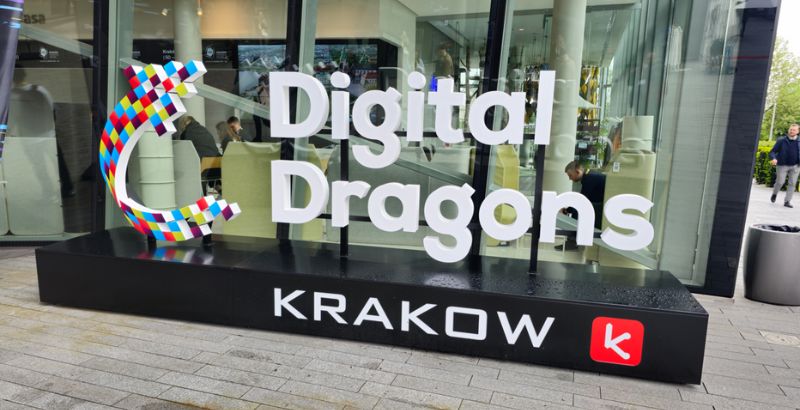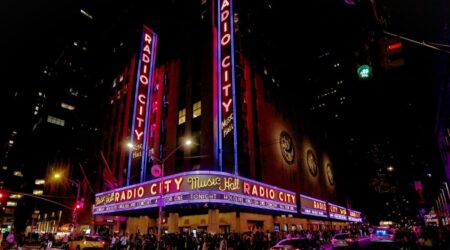
Digital Dragons is Poland’s premiere gaming industry event. It’s a two-day event that serves multiple purposes. Even though it primarily focuses on developers in the region; there are professionals from all over the world in attendance. Developers and Publishers use this event to network, recruit, and exchange ideas.
Recruiting is a very important aspect of the convention, as companies often schedule or conduct interviews on the spot. Just about everyone that has a booth is doing recruiting of some kind. And the person they would immediately report to is often the one conducting the interview. There are also representatives from companies whose job is to recruit new clients. The clients are publishers and developers in this case. Companies like AMD and Unity maintain a presence at these events because they depend on these companies being successful. They’re here to answer any questions that they may have that could impact current and future projects.
The exchange of ideas primarily takes place in one of three places: panels, lectures, or one of the many social events that go on during the convention. The workshops and lectures are conducted in either the big auditorium or the smaller classroom setting. I was able to attend the Science of Horror panel. This panel featured speakers Mikael Kasurinen from Remedy Entertainment, Tom Heaton from Supermassive Games, Kelvin Moore from Sumo Digital, Mateusz Witczak from Mighty Pirate!, and Wojciech Piejko from Bloober Team. The panel focused on several horror-related topics like social issues, representation, balance, and why people love being scared.
Tom Heaton spent time talking about horror in gaming is lagging behind the film industry when talking about social issues. However, he does believe they will catch up sooner rather than later. I did like that they spent time talking about Resident Evil 4. The panel loves the entire series but understands that Ashley does fall into that Damsel in Distress trope. They also collectively came out against jump scares in favor of relying more on creating horror through the atmosphere.
I managed to attend two lectures as well. The lectures are a bit more intimate due to the setting and they speak to very specific issues people in the industry face. And unlike panels, the lectures are usually set up for Q&A afterward. One lecture we attended was titled Artist vs Manager led by Kacper Niepokólczycki of CD PROJEKT RED. It was a very insightful look into the process of someone who has worked on popular titles like Cyberpunk 2077 and The Witcher 3: The Wild Hunt. He talked about his experience with navigating the industry and how others may apply what he learned in their situation. And he was very aware of the fact that his experience may not be the same for others.
He repeated this a few times during his lecture. But he wanted to offer his experiences as a way of getting people to see what’s going on in their teams and how they could adapt what they learn from him to their unique situations. Kacper also spent a lot of time talking about empathy, which some may feel is unexpected at a tech conference. An example he gave is when he’s putting together his teams for games, he’s asking people to relocate their entire lives and families to the area. And sometimes things change and someone may need to be let go. He talks about not taking any personnel changes lightly because of the ripple effect that can happen.

The second lecture we attended was conducted by Jula Arendt, titled: Designer in Multiverses of Technologies. This one was motivational and introspective. Since this convention attracts so many people looking to get into the industry, it’s helpful to hear someone coming from a completely unrelated background. Jula got into gaming through their background in architecture. She was able to translate those skills into her current role as an Art Director at Reverist and has worked on games like Cyberpunk 2077 and Dying Light 1.
Her understanding that taking the leap is risky was very helpful. She made a comfortable living as an architecture and could have stayed in the industry for the rest of her life. But felt that gaming was her true calling because it allowed for a different kind of creativity. Depending on someone’s background, you may not even need to attend formal education; just have a willingness to learn.
The emphasis on setting realistic professional development goals was really important as well, which often gets understated at these kinds of conferences and some people feel overwhelmed when trying to apply what they’ve learned. Jula’s lecture pushed people to go at their own pace and to not put pressure on themselves. The goal should be to try and not have a certain destination by a fixed date.
Digital Dragons also features an Indy Showcase that facilitates the opportunity for smaller developers to get their projects seen by others in the industry. This is also how larger companies do some of their recruiting. The Digital Dragons Arena is for smaller developers that have things in production but they may need funding to keep it going. They can make their pitches face to face which can often make a difference.
Day 1 concluded with Digital Dragon Awards Ceremony. Dying Light 2: Stay Human won the award for Best Polish Game. Some other award winners include Cyberpunk 2077 for Best Ongoing Polish Game and Elden Ring for Best Foreign Game. You can find the full list of winners and ceremony highlights here.
Stay tuned for our day 2 coverage as well as some interviews with industry professionals.






